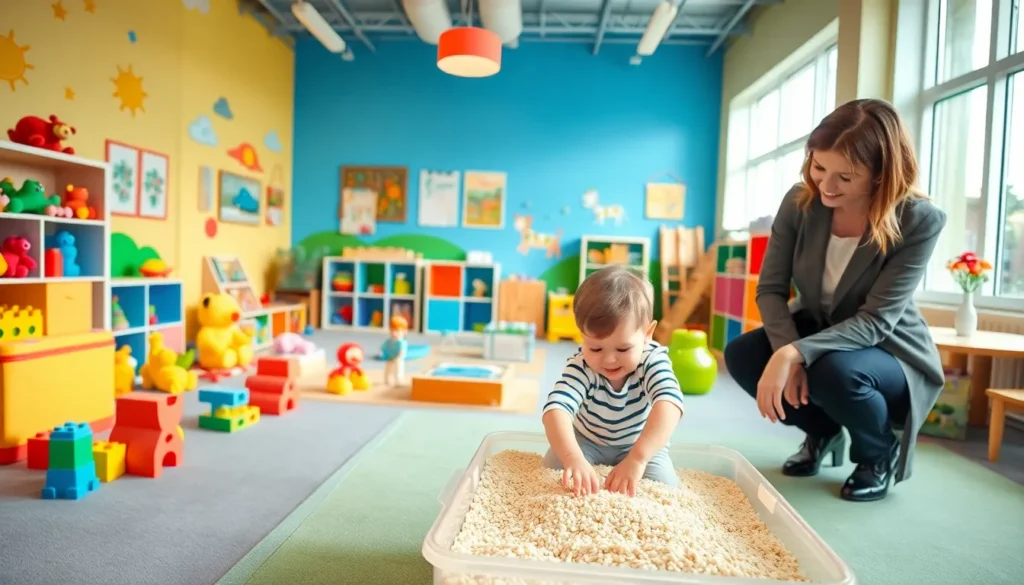Navigating the complexities of coparenting can be challenging, yet it’s essential for the well-being of children. Effective coparenting isn’t just about sharing responsibilities; it’s about fostering a healthy environment where children can thrive. When parents work together harmoniously, they provide stability and support that significantly impacts their kids’ emotional and psychological development.
By prioritizing communication and collaboration, coparents can create a positive co-parenting dynamic. This not only benefits the children but also helps parents build a respectful relationship, easing the stress of shared parenting. Understanding the key principles of effective coparenting can lead to a more fulfilling experience for everyone involved, ensuring that children feel loved and supported, no matter the circumstances.
Table of Contents
ToggleUnderstanding Effective Coparenting
Effective coparenting entails more than sharing responsibilities; it involves collaboration and communication to create a nurturing environment for children.
Definition of Coparenting
Coparenting refers to the joint management of parenting duties by two individuals, often following a separation or divorce. This relationship includes major decisions regarding education, health, and emotional well-being. Coparenting fosters cooperation between parents, ensuring that children benefit from consistent guidelines, love, and support.
Importance of Effective Coparenting
Effective coparenting enhances children’s stability and emotional health. Research shows that children with cooperative coparents report higher levels of happiness and lower levels of anxiety. Positive interactions between parents can reduce conflict, promote mutual respect, and create a secure atmosphere for children. When parents maintain clear communication and share responsibilities, they cultivate a unified approach tailored to their children’s needs, ultimately benefiting the entire family dynamic.
Key Principles of Effective Coparenting

Effective coparenting relies on the establishment of strong principles that guide interactions and decisions. Two of the most critical components are communication and cooperation.
Communication
Communication forms the backbone of effective coparenting. Coparents must share information regarding their children’s daily activities, health, and education. They should communicate regularly to discuss any concerns or adjustments necessary to parenting plans. Utilizing different communication methods, such as in-person meetings, emails, or co-parenting apps, helps keep all parties informed. When discussing sensitive topics, keeping a respectful tone supports a constructive dialogue. Clarity in communication aids in minimizing misunderstandings, allowing coparents to stay aligned on important decisions.
Cooperation
Cooperation is essential for successful coparenting. Parents should approach shared responsibilities with a willingness to collaborate. Each parent should contribute to decision-making processes, ensuring both perspectives are considered. Establishing routines that involve both parents, such as attending children’s events together, fosters a united front. Showing flexibility during challenging moments also strengthens cooperation. When parents commit to working together—even amid disagreements—their children benefit from a stable environment filled with mutual respect and teamwork.
Benefits of Effective Coparenting
Effective coparenting creates a nurturing environment, fostering positive outcomes for both children and parents. The advantages span emotional, psychological, and relational well-being.
For Children
Children benefit significantly from effective coparenting. Consistent support from both parents enhances their emotional security, leading to improved mental health outcomes. Children experience:
- Stability: Having two proactive parents provides a reliable framework, helping children adapt better to changes.
- Happiness: Research indicates children engaged in cooperative parenting report higher happiness levels.
- Anxiety Reduction: Lower parental conflict correlates with decreased anxiety and stress among children.
- Emotional Development: Coparenting enables healthy emotional expression and coping mechanisms.
- Role Modeling: Effective collaboration between parents teaches children vital skills in communication and conflict resolution.
For Parents
- Reduced Stress: Clear communication and shared responsibilities lower the emotional burden associated with parenting.
- Improved Relationships: Respectful interactions create a foundation for a healthier co-parenting dynamic and personal relationships.
- Shared Decision-Making: Collaborating on important decisions fosters mutual respect and understanding.
- Better Parenting Outcomes: A unified approach enhances parenting practices, benefiting the children and their development.
- Personal Growth: Coparenting strengthens interpersonal skills and promotes personal development through teamwork and compromise.
Challenges in Effective Coparenting
Effective coparenting presents various challenges that can affect the well-being of children. Understanding these obstacles is crucial for fostering a collaborative environment that supports the needs of the children.
Common Obstacles
- Communication Breakdowns: Misunderstandings often arise due to inadequate communication between coparents. Lack of clarity regarding schedules, responsibilities, or decisions can lead to conflicts.
- Emotional Strain: Residual feelings from separation or divorce can create tension. This emotional strain may hinder cooperation and affect interactions.
- Differing Parenting Styles: Diverse approaches to discipline, education, and daily routines can result in disagreements. Varied values and beliefs often complicate joint decision-making.
- Inconsistent Rules: Children thrive on consistency. Inconsistent rules between households can create confusion and insecurity, making it harder for children to adapt.
- Negative Influences: External factors, such as parental partners or family members, can introduce conflicts. These influences may increase stress and complicate the coparenting relationship.
Strategies to Overcome Challenges
- Establish Clear Communication: Prioritize regular check-ins and information sharing. Using a shared calendar or communication app can streamline updates about children’s activities and important decisions.
- Practice Active Listening: When discussing sensitive topics, employing active listening fosters understanding. Acknowledging each other’s perspectives reduces misunderstandings and enhances cooperation.
- Create a Parenting Plan: Developing a detailed parenting plan outlines responsibilities, schedules, and rules. This plan serves as a reference point, ensuring consistent parenting and reducing conflicts.
- Seek Professional Support: Engaging a mediator or counselor can resolve disputes effectively. Professional guidance helps both parents navigate challenging emotions and enhance communication.
- Focus on the Children’s Needs: Maintaining a child-centered approach encourages collaboration. Prioritizing the children’s well-being strengthens the coparenting dynamic and minimizes ego-driven conflicts.
Effective coparenting is essential for nurturing children’s emotional and psychological well-being. By prioritizing communication and cooperation, parents can establish a supportive environment that reduces conflict and fosters mutual respect. This collaborative approach not only benefits children but also enhances the overall family dynamic.
Navigating the challenges of coparenting requires commitment and a willingness to adapt. By focusing on shared responsibilities and maintaining open lines of communication, parents can create a stable atmosphere that promotes happiness and emotional security. Ultimately, successful coparenting lays the groundwork for a healthier future for both children and parents, ensuring that everyone involved feels valued and supported.




